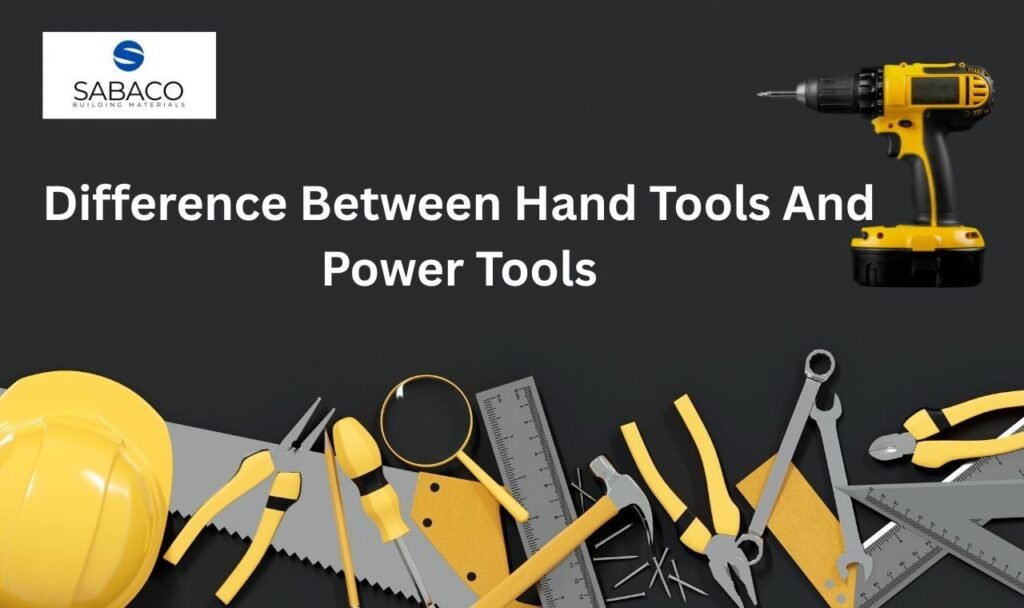A Complete Guide To The Difference Between Hand Tools And Power Tools

Tools are important after all, when it comes to construction, maintenance, repairs, and processes. Yet, knowing the distinction between hand and power tools is important to selecting the appropriate equipment for a project. Below, in this deep dive guide, we’ll help you in what makes one different from the other, the pros and cons, and how you can make the decision on which tool is best for your use.
What Are Hand Tools?
Hand tools are operated manually and do not need electricity. They are of ancient origin and design, usually more modest. Common Examples of Hand Tools:
- Screwdrivers
- Hammers
- Wrenches
- Pliers
- Hand saws
- Chisels
- Tapes and levels
Advantages of Hand Tools: A Closer Look
Tools for hand have become an integral element of maintenance, construction, and repair for centuries, and for the right reasons. While power tools offer speed and efficiency, hand tools provide numerous advantages that make them useful in all kinds of scenarios.
1. No Power Source Required - Can Be Used Anywhere
One of the most significant benefits of hand tools is that they are completely independent of electricity. This makes them extremely easily transportable.
- Excellent for remote locations in which power might not be accessible.
- Ideal for urgent repairs
2. Greater Precision For Delicate Or Detailed Work
Hand tools give you a degree of precision and control. Power tools typically aren’t able to match, making them perfect for tasks that require precise motor skills or delicate handling.
- Great for intricate engraving, woodworking, or trimming
- Allow precise adjustment and perfecting
- Reduce the risk of cutting, stripping, and damaging materials
- Most favored by customers for the art of craftsmanship, artisanal work, and tasks that require finishing
Since the user is the one who determines the force and movements, hand tools are helpful when precision and care are more important than speed.
3. Lower cost and easier to maintain
In comparison to power tools, hand tools are much cheaper, both in terms of the initial investment as well as regular maintenance.
- Lower initial cost–no requirement for batteries, motors, or complicated systems
- Low maintenance–no electric parts, as well as fuel systems that need to be maintained
- Less chance of mechanical failure
- Longer life span when stored properly and utilized
What Are Power Tools?
The Power Tools are devices that are driven through an external source of energy like batteries, electricity, compressed air, or fuel. They are engineered to maximize efficiency and speed. Common Examples of Power Tools:
- Drills with electricity
- Angle grinders
- Circular saws
- Power sanders
- Nail guns
- Impact wrenches
- Jigsaws
Advantages of Power Tools: A Detailed Breakdown
Power tools have changed the way we perform carpentry as well as DIY projects. Here is a review of the main positives of powerful tools.
1. Faster and more efficient for heavy duty tasks
- Improved effectiveness: Ideal for repetitive tasks such as screwing, or cutting.
- Consistent results: Because the motor performs the work, it performs better across multiple tasks.
- Reduces the cost of labor. Speedier completion times translate into fewer person-hours spent on the job.
2. Require less physical effort
Power tools are made to minimize strain on your hands and make these tools more comfortable and easier to work with for long periods of time.
- Motor-powered operations minimize the requirement to use physical forces.
- It is more accessible to those with various strengths and level of skill.
- Perfect for jobs that are otherwise physically demanding, such as drilling through concrete or drilling screws through hardwood.
3. Ideal for large scale projects
Power tools are ideal in situations where speed and size matter.
- Renovation and construction initiatives benefit from quick and high-volume projects.
- Industrial and commercial sites depend on the accuracy and output of power tools.
- Repairs or installations that require time are possible to complete in a shorter timeframe.
- Ideal to handle massive tasks such as making hundreds of tile pieces, drilling numerous holes, or installing massive fixtures.
4.Can Handle tougher materials
- In contrast to hand tools, they are designed to be used with tough or even high end materials.
- Angle grinders can be used to grind or chip.
- Power sanders and planers are able to use metal surfaces and hardwoods effectively.
- Tools that are specially designed, such as impact drivers give you the power needed for the most demanding jobs.
- This is why power tools are crucial to the construction industry, renovations, as well as industrial applications where power and durability are essential.
When to use hand tools vs power tools
The decision among hand instruments as well as electric tools isn’t about a preference but about choosing the best tool to do the task. Knowing the right time to choose one over the other could result in higher quality.
Choose Hand Tools For:
1. Precision Tasks
- Ideal to use for exquisite woodworking cutting, trimming, or shaping tasks
- Perfect to use in restricted areas in which power tools could be too large or aggressive.
- It is useful for finishing work, for example, the adjustment of small components, or for finishing touches
- Ideal for jobs that require fragile materials that are prone to breaking due to too much force
2. Small Repairs
- If the job isn’t too complicated, hand tools are typically more efficient and more cost effective.
- There is no need to set up or power sources. Simply take a few items and go
- Lower risk of over-tightening cutting, causing damage, or over-tightening components
- Great idea for easy fixes at home or in the office
Choose Power Tools For:
1. Large-Scale Jobs
Power tools are designed to be fast, which makes them the ideal tool for projects with short deadlines or a large volume of work.
- Significantly reduces the time spent at work
- Provides consistently high performance throughout long hours
2. Heavy duty cutting or grinding
- Tasks that involve tough material as well as high resistance need the strength and torque that only power tools are able to provide.
- Created for cutting through metal, concrete, and hardwoods, and even stone
- Provides more RPMs and torque than manual tools.
- Reduces fatigue for users when dealing with hard materials.
Conclusion
Understanding the distinction between hand as well as power tools is vital to selecting the best tool to complete the task. While hand tools offer greater control, precision, and simplicity. Power tools provide speed, power, and efficiency. Selecting the best tool for your needs will not only increase your efficiency but also improve the safety as well as overall quality. Sabaco offers a wide range of products, including power tools, adhesives, paints, and making it a one-stop shop for all your construction needs.
FAQ
1. Do professionals employ hand power tools or hand equipment?
The majority of professionals utilize both depending on the task. Power tools are generally used for efficiency, whereas hand tools are favored for finishing.
2. Do novices make use of powered tools?
Yes, beginners can utilize power tools. It is essential to read the instructions and begin with the basics to increase confidence.
